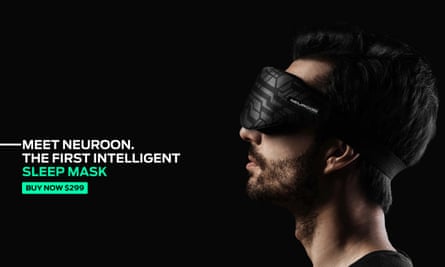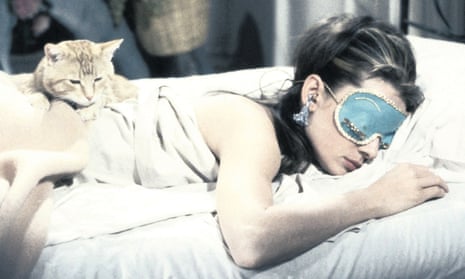Sleep deprivation used to be a badge of honor: a sign you were busy and important and very much in demand. Snoozing was losing and sleep was for wimps. Now, however, Arianna Huffington’s The Sleep Revolution, a call-to-bed that promises to transform your life, “one night at a time”, is a New York Times bestseller, and Huffington is crisscrossing the country urging people to “sleep their way to the top”.
The Guardian’s product and service reviews are independent and are in no way influenced by any advertiser or commercial initiative. We will earn a commission from the retailer if you buy something through an affiliate link. Learn more.
Meanwhile, the sleep industry has woken up big time and a slew of startups are reinventing where, when and how we sleep – as well as how much we’re prepared to pay for it. Companies like Casper are getting millions of dollars in funding to disrupt the mattress market. Sleep salons like YeloSpa let urbanites nap – just a $1 a minute!
For the more upmarket snoozer, luxury hotels are offering “sleep retreats”; north of $1,000 gets you dinner and a movie about sleep. You might want to pack your performance pajamas; a moisture-wicking cami for a cooler night’s sleep sets you back $66. And if you’re staying home, you can upgrade your bedroom with everything from a mattress cover ($249) with a sensor that tracks your sleep to a brainwave-monitoring sleeping mask ($299) that lets you nap more efficiently.

Sleep hasn’t just been corporatized – it has infiltrated corporations. A number of companies already boast nap pods and Huffington predicts that nap rooms in offices are going to be “as common as conference rooms” in the next two years.
So how did this happen? How did sleep, something humans have done since long before Huffington awoke to it, suddenly become so fashionable?
A number of factors feed into the way we’re putting a higher value on sleep – both culturally and financially. Health and wellness have become more aspirational, for one.
Our bodies have become input/output devices to be monitored and optimized, and sleep is another data set to be tracked
Getting enough sleep is a natural fit for the sort of lifestyle in which paying $10 for green juice and $34 for a SoulCycle class is the norm. Then there’s the rise of the quantified self through wearable technology. Our bodies have become input/output devices that we monitor and optimize for greater efficiency, and sleep has become another data set to be tracked and hacked. What Huffington emphasizes about sleep, after all, is not that it rests you but that it restores you. Sleep, she says, is the ultimate performance enhancer.
The main reason sleep’s stock has gone up, however, is that very few people can actually afford to sleep much. Forget Birkin bags and superyachts: getting eight hours of rest has become the ultimate status symbol.
You know how Arianna Huffington gets her eight hours? Well, for one thing, she has “nine or so” assistants, according to a recent New York Times profile. Huffington calls them her “A-Team”; they do everything from running her errands to planning her travel to loading the Huffington Post on her computer in the morning. According to the Times, most of the A-Team can only endure about 12 months of the work because it’s so taxing. The low pay also means many of them take second jobs. Basically, they don’t sleep so that Huffington can … and can sell books about it.

“Sleep is one of humanity’s great unifiers,” writes Huffington in one of her many articles about sleep. But while the need for sleep may be one of humanity’s unifiers, the ability to actually get a good night’s sleep is emblematic of society’s great divisions.
Getting enough sleep isn’t just a question of valuing sleep enough to go to bed at the right time; it’s a question of going to bed in the right neighborhood, and in the right body. Numerous studies show that you’re more likely to sleep poorly if you’re poor. It’s hard to sleep if you’re worried about your safety or haven’t had enough to eat. It’s hard to sleep if you’re one of the 15 million American shift workers who work irregular hours. Research has also found that there’s a black/white sleep gap. One study shows that while white people sleep an average of 6.85 hours, African Americans sleep an average of 6.05 hours. They also have a lower quality of sleep. Researchers have attributed this, in part, to the stress of discrimination.
A good night's sleep is emblematic of society's great divisions
Want to know who gets the most sleep and the best quality of sleep in America? Wealthy white women. Which, if I’d hazard a guess, is probably the same demographic Huffington is targeting her book at. Huffington positions her proselytization of sleep as a “revolution”, but really it’s a rebranding. Getting enough sleep is the new “leaning in”: advice for the 1% that ignores the socioeconomic elephant in the room. The very real sleep crisis we face isn’t down to a few rich people thinking it’s a waste of time; it’s down to the 99% not being able to afford to spend time sleeping. (Oh, in case you’re wondering, Sheryl Sandberg has endorsed Huffington’s book, saying “Sometimes we need to sleep in to lean in!” Sure! Just make sure to brief your assistants first.)
While sleep is currently enjoying a moment, I’ve got a feeling it will be short-lived. Sleep may be a performance enhancer, but it’s an inefficient one. The real prize is finding a way to negate sleep deprivation so humans can function on less sleep. Unsurprisingly, the military is at the forefront of this research. In 2008, the Pentagon published a report called “Human Performance” which examined the possibility of a future in which soldiers could perform at their peak with only a couple of hours’ sleep. “Suppose a human could be engineered who slept for the same amount of time as a giraffe (1.9 hours per night). This would lead to an approximately twofold decrease in the casualty rate. An adversary would need an approximately 40% increase in the troop level to compensate for this advantage.” The report goes on to look at the effects of ampakines, a class of drugs that modulate neurotransmitters in the brain, to remove the effects of sleep deprivation.
Eventually, humans will figure out a way to hack sleep. Spending a third of your life unconscious won’t be a luxury anymore; it’ll be something only the poor will be forced to do. At which point we may need a whole new sort of sleep revolution.

Comments (…)
Sign in or create your Guardian account to join the discussion